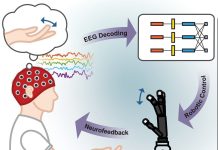
A study by University College London (UCL) has revealed that hunger hormones produced in the gut can directly impact a decision-making region of the brain, influencing an animal’s behavior when considering food.
This study, conducted in mice and published in Neuron, is the first to demonstrate how hunger hormones can affect the activity of the hippocampus, a crucial part of the brain associated with decision-making when animals are contemplating food choices.
Lead author Dr. Andrew MacAskill explained that hunger has a significant influence on decision-making related to food. However, the underlying mechanisms are complex and involve contextual learning.
The study aimed to uncover how the levels of hunger hormones produced in the gut can affect the brain’s ability to contextualize food choices.
For the study, researchers placed mice in an arena containing food and observed their behavior when hungry and full.
Real-time brain imaging was employed to investigate neural activity. The focus was on the ventral hippocampus, a region known for its role in forming and using memories to guide behavior.
The research uncovered that activity in specific brain cells within the ventral hippocampus increased when animals approached food, inhibiting them from eating.
However, when the mice were hungry, this area had reduced neural activity, allowing the hippocampus to no longer deter the animals from eating.
This change in neural activity corresponded to elevated levels of the hunger hormone ghrelin in the blood.
Previous studies indicated that animals, including non-human primates, possess ghrelin receptors in the hippocampus. However, their function remained unclear.
This study has shown that ghrelin receptors in the brain allow the hunger hormone to cross the blood-brain barrier and directly influence brain activity, specifically controlling a neural circuit that is likely to be similar in humans.
The Brain’s Role in Regulating Eating Behavior
Dr. MacAskill explained that the hippocampus acts as a brake on an animal’s instinct to eat when it encounters food, preventing overeating.
However, when hunger hormones signal that the animal is indeed hungry, the brain switches off these brakes, allowing the animal to begin eating.
Future Research and Implications
The researchers plan to investigate further how hunger may impact learning or memory by assessing whether mice perform non-food-related tasks differently based on their hunger level.
They also aim to explore potential links between hunger hormones, stress, and thirst. The study’s findings may have implications for understanding eating disorders and their potential association with ghrelin receptors in the hippocampus.
Additionally, it could shed light on the links between diet and various health outcomes, including mental health.
The UCL study offers valuable insights into the influence of hunger hormones on decision-making processes within the brain, specifically within the ventral hippocampus.
By elucidating these mechanisms, the research contributes to a deeper understanding of how hunger affects our behavior and choices related to food.
The findings may have broader implications for research into eating disorders, mental health, and the impact of diet on overall health outcomes.
If you care about diabetes, please read studies about berries that can help prevent diabetes, obesity, and cancer, and new drugs to treat diabetes and metabolic syndrome.
For more information about diabetes, please see recent studies about the normal blood sugar for people with diabetes, results showing that Zinc may be the key to better diabetes treatments.
The research findings can be found in Neuron.
Copyright © 2023 Knowridge Science Report. All rights reserved.



